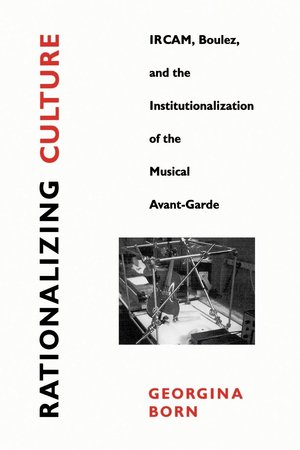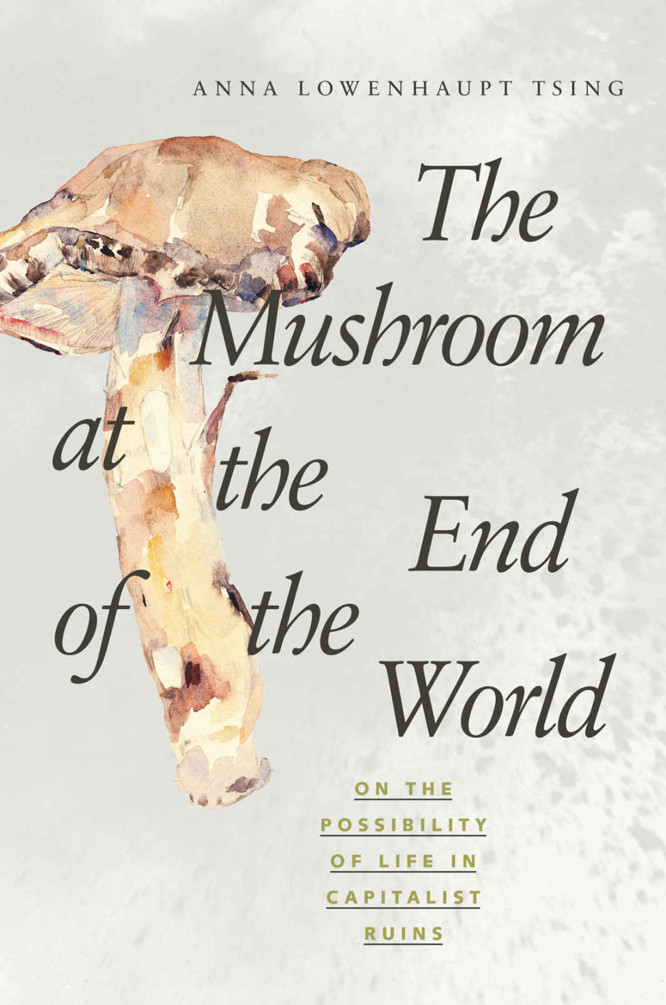Georgina Born: Rationalizing Culture: IRCAM, Boulez, and the Institutionalization of the Musical Avantgarde (1995)
Filed under book | Tags: · anthropology, avant-garde, computer music, electroacoustic music, ethnography, music

“Anthropologist Georgina Born presents an ethnography of the renowned Institut de Recherche et de Coordination Acoustique/Musique (IRCAM) in Paris. As a year-long participant-observer, Born studied the social and cultural economy of an institution for research and production of avant-garde and computer music. She gives a unique portrait of IRCAM’s composers, computer scientists, technicians, and secretaries, interrogating the effects of the cultural philosophy of the controversial avant-garde composer, Pierre Boulez, who directed the institute until 1992.
Born depicts a major artistic institution trying to maintain its status and legitimacy in an era increasingly dominated by market forces, and in a volatile political and cultural climate. She illuminates the erosion of the legitimacy of art and science in the face of growing commercial and political pressures. By tracing how IRCAM has tried to accomodate these pressures while preserving its autonomy, Born reveals the contradictory effects of institutionalizing an avant-garde.”
Publisher University of California Press, Berkeley, CA, 1995
ISBN 0520202163, 9780520202160
xvi+390 pages
Reviews: Tia DeNora (Am J of Sociology, 1996), Eduardo de la Fuente (Culture and Policy, 1996), Simon Emmerson (Review: J Royal Musical Association, 1997), Timothy Dowd (Contemporary Sociology, 1997), Paul D. Lopes (American Ethnologist, 1998), Elizabeth Hinkle-Turner (Computer Music J, 1999).
PDF (17 MB)
Comment (0)Anna Lowenhaupt Tsing: The Mushroom at the End of the World: On the Possibility of Life in Capitalist Ruins (2015)
Filed under book | Tags: · anthropology, bioculture, capitalism, collaboration, ethnography, forest, multispecies, mushrooms, precarity

“Matsutake is the most valuable mushroom in the world—and a weed that grows in human-disturbed forests across the northern hemisphere. Through its ability to nurture trees, matsutake helps forests to grow in daunting places. It is also an edible delicacy in Japan, where it sometimes commands astronomical prices. In all its contradictions, matsutake offers insights into areas far beyond just mushrooms and addresses a crucial question: what manages to live in the ruins we have made?
A tale of diversity within our damaged landscapes, The Mushroom at the End of the World follows one of the strangest commodity chains of our times to explore the unexpected corners of capitalism. Here, we witness the varied and peculiar worlds of matsutake commerce: the worlds of Japanese gourmets, capitalist traders, Hmong jungle fighters, industrial forests, Yi Chinese goat herders, Finnish nature guides, and more. These companions also lead us into fungal ecologies and forest histories to better understand the promise of cohabitation in a time of massive human destruction.
By investigating one of the world’s most sought-after fungi, The Mushroom at the End of the World presents an original examination into the relation between capitalist destruction and collaborative survival within multispecies landscapes, the prerequisite for continuing life on earth.”
Publisher Princeton University Press, Princeton, 2015
ISBN 0691162751, 9780691162751
xii+331 pages
Reviews: Stefan Helmreich (Am Ethnologist, 2016), Eleana J. Kim (Current Anthropology, 2016), Emily Yates-Doerr (Medicine Anthropology Theory, 2016), James P. Verinis (Culture, Agriculture, Food and Environment, 2016), PD Smith (The Guardian, 2017), Joshua A. Bell (Anthropological Q, 2017), William E. O’Brien (AAG Review of Books, 2018), Jason Cons (J Asian Studies, 2016), Jim Igoe (Am Anthropologist, 2016), Eugene N. Anderson (Ethnobiology Letters, 2015), Justine Williams (Transforming Anthropology, 2016), Brandon Bodenstein (Anthropology and Humanism, 2017), Hjorleifur Jonsson (Asia Pacific J Anthropology, 2017), Danya Glabau (J Cultural Economy, 2017), Carmen Victor (Culture Machine, 2017), Sian Sullivan (Dialogues in Human Geography, 2018), Frédérique Aït-Touati (Critique, 2019, FR), Bruno Latour (n.d.).
Comment (1)Environmental Humanities, 8(1): Multispecies Studies (2016)
Filed under journal | Tags: · animal, biology, botany, environment, ethnography, multispecies

“The emerging field of multispecies studies, grounded in passionate immersion in the lives of fungi, microorganisms, animals, plants, and others, is opening up novel ways of engaging with worlds around us. This issue brings together some of the leading scholars in this field to explore what is at stake—epistemologically, politically, ethically—for different forms of life caught up in diverse relationships of knowing and living together. The collection takes us into the worlds of sheep and shepherds; of stones, worms, salmon, and forest-devouring beetles; of viruses and their elephants; of seals, crows, and lava flows in Hawaii; and finally of frogs-as-pregnancy-tests and possible agents of pathogenic fungal spread. Each of the contributors explores what difference curious and careful attention to others might make in our efforts to inhabit and coconstitute flourishing worlds in these difficult times.”
Edited by Thom van Dooren, Ursula Münster, Eben Kirksey, Deborah Bird Rose, Matthew Chrulew, and Anna Lowenhaupt Tsing
Publisher Duke University Press, May 2016
Creative Commons license CC BY-NC-ND 3.0
ISSN 2201‐1919
148 pages
HT marcelo
HTML, PDFs (updated on 2018-4-26)
single PDF (2 MB)

